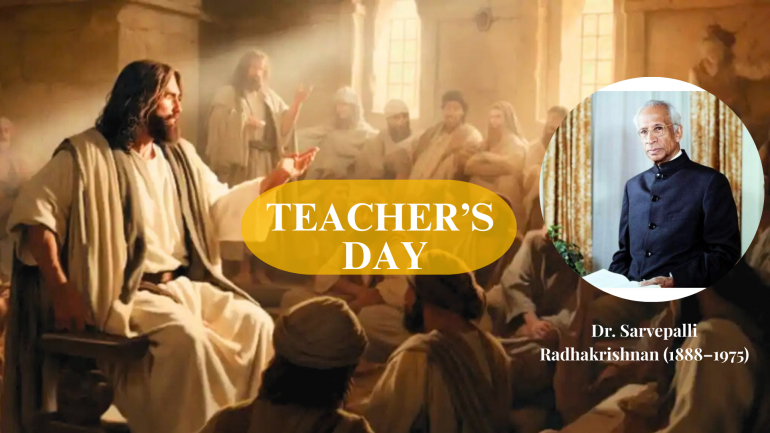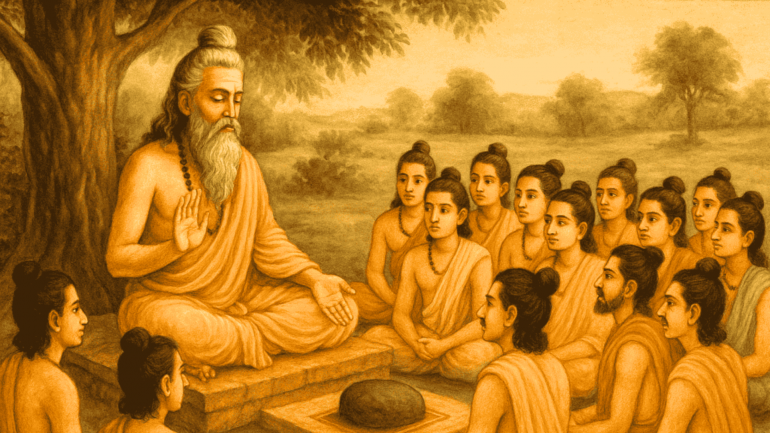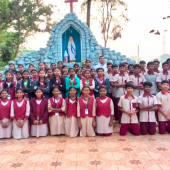More than Wages

(In India, every September 5 is celebrated as Teacher’s Day in honor of Dr. Sarvepalli Radhakrishnan (1888–1975), a renowned philosopher, scholar, teacher, and the second President of India. In this Teacher’s Day special article, Fr. Nilesh Parmar, a Jesuit with over thirty years of experience working among the tribals of Northeast India, shares what it means to be a Christian teacher and how, in the modern world, no AI tool can replace the real-life teacher. For to teach is not simply to show where water is, but to quench a thirst. - Chief Editor)
A group of boys went hiking in the hills. Their laughter filled the air until they reached the mouth of a long, dark tunnel. Fear silenced them.
At the entrance sat an old man with a lantern.
“On the other side,” he said, “are meadows, streams, and the fragrance of wildflowers.”
The boys’ eyes widened.
They gave the old man a little wage, and he walked ahead, holding the lantern high. As they moved through the tunnel, he told them stories of dangers to avoid, of treasures to expect, of beauty waiting to be seen.
At last, light broke in. They came out into the meadows, just as he had described. The old man quietly sat on a stone by the path.
One boy turned back, bowed, and said, “Master, without you, we would never have crossed this tunnel. And without your stories, we would not have desired to see.”
The old man smiled. His work was done.
Every teacher receives wages like the lantern bearer. But like the lantern bearer, teachers go beyond the contract and salary. They spend hours polishing their lantern, wiping the glass so that the best rays of light pierce the darkness. None of this is listed in a job description. None of it is compensated in monthly wages. And yet, it is precisely these unseen acts of care that change students' lives forever. Therefore, in every culture and tradition, they are honoured.
In the Indian spiritual tradition, the word Guru (teacher) carries a profound meaning. Derived from the Sanskrit roots “Gu” (darkness) and “Ru” (remover), a Guru is not merely a teacher of information but a guide who leads the disciple from darkness (ignorance) to light (wisdom). This unique role elevates the Guru to a sacred position, so sacred that the ancient texts declare, “Guru Devo Bhava”, the Guru is to be revered as God.

In the Christian vision, a teacher is not merely an instructor of subjects but a shepherd of souls, a co-creator with God in nurturing wisdom, character, and faith. Teaching is a sacred vocation, a call from the divine, a call to turn the classroom into a sanctuary of love, where the truth is taught and students are embraced as children of God.
The Christian teaching pedagogy is based on Scripture. In the Gospels, Jesus is consistently referred to as Rabbi (Teacher). He taught not just with words but with His very life, through compassion, parables, silence, and sacrifice. His teaching touched hearts because it was rooted in love. St. Paul reveals that teaching is not mechanical instruction but a relationship of love, guidance, and fatherhood/motherhood. He writes: “You have countless guides in Christ, but not many fathers. For I became your father in Christ Jesus through the gospel” (1 Corinthians 4:15). We are exhorted to mould characters: “Train up a child in the way he should go; even when he is old he will not depart from it” (Proverbs 22:6).
In a world where students often carry hidden wounds, insecurities, and fears, St. John Don Bosco’s Preventive System of education, based on three pillars: reason, religion, and loving-kindness, can make the classroom a safe haven of love. By this method, every act of patience, encouragement, and understanding becomes a small liturgy of grace. Just as the sanctuary of the church is a place where God’s presence is felt, the classroom can be a place where God’s love is made tangible through the teacher’s presence.
Today, a search engine can provide data, but it cannot give wisdom or breathe soul into knowledge. Technology can deliver facts in an instant, but it cannot teach us how to live with those facts. It can tell us the chemical composition of water, but it cannot quench the thirst of the heart. It can show us thousands of books on love, but it cannot make us truly love. It can list countless definitions of peace, but it cannot separate two fighting boys in the classroom and help them reconcile. Information without guidance often leaves us fragmented, restless, and confused.
In today’s world, information is available at the touch of a button, but wisdom and love cannot be downloaded. That is the sacred task of a Christian teacher, who is called to be more than an academic instructor:
-
An eye of faith, seeing every student as created in the image and likeness of God (Genesis 1:27).
-
A living witness, whose integrity and compassion silently teach more than words ever could.
-
A spiritual guide, helping students to recognize God’s hand gently at work in the ordinary events of daily life.
-
A lantern bearer, like John the Baptist, who pointed not to himself but to Christ, declaring: “He must increase, I must decrease” (John 3:30).
Christian teachers are more than wage-earners; they are lantern bearers who guide souls through life’s tunnels. Their true reward is not in salary slips, but in following their Guru, Jesus Christ’s command to love. They are called to a silent but sacred mission: to lead every soul to the truth.
Radio Veritas Asia (RVA), a media platform of the Catholic Church, aims to share Christ. RVA started in 1969 as a continental Catholic radio station to serve Asian countries in their respective local language, thus earning the tag “the Voice of Asian Christianity.” Responding to the emerging context, RVA embraced media platforms to connect with the global Asian audience via its 21 language websites and various social media platforms.
Comments
Thank you father Nilesh 🙏🏻😌 m blessed n previledged to being your student. I'll remain evergrateful for your Bible class which rooted in my soul to save souls . Thank you Dear father.
May God keep you safe n long life to save many more souls 🙏🏻😌❤️👍
















- Reply
Permalink